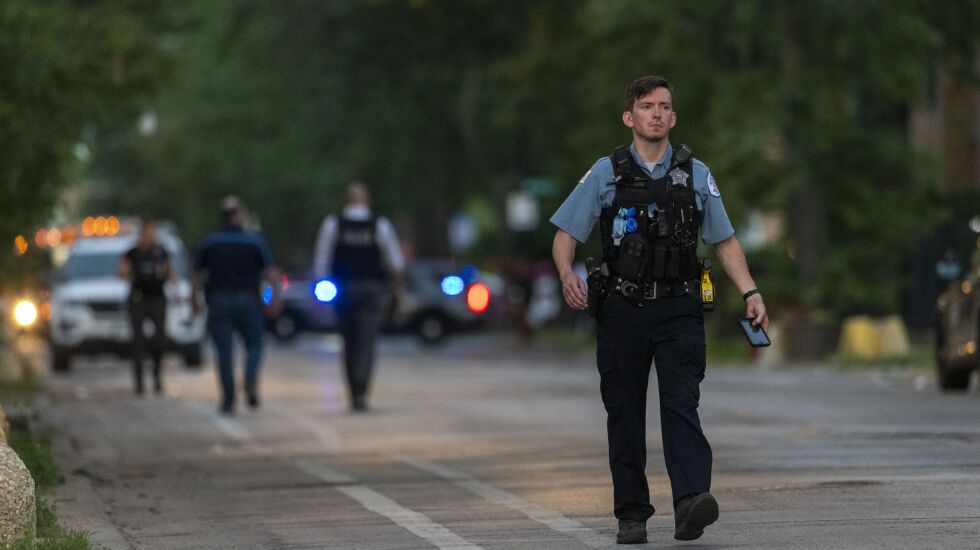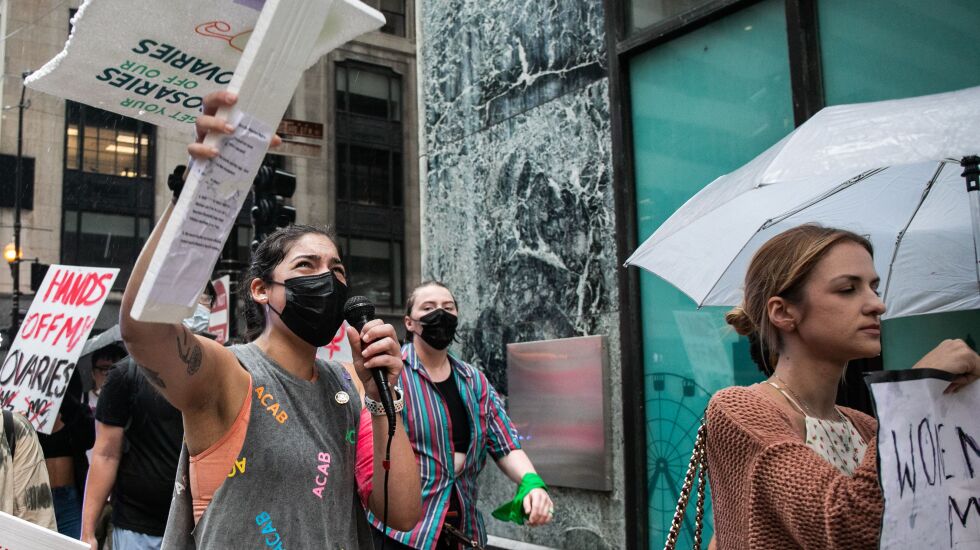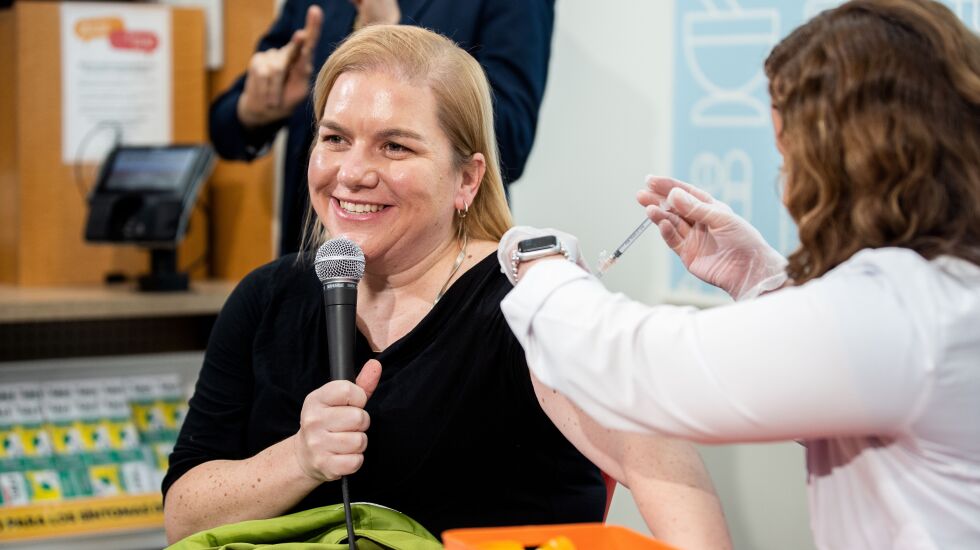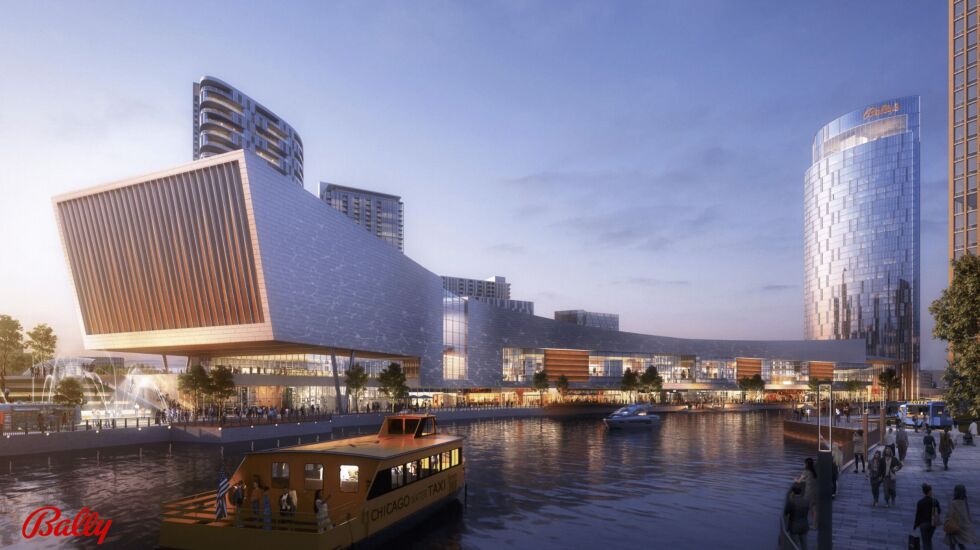It started in the middle of a COVID-19 surge and ended with possible hints of another.
In between, stalwarts of Chicago politics faced ignominious exits, thousands of people made their way to Illinois seeking refuge and health care — and unthinkable pain befell a picturesque north suburban city. All the while, thousands of Chicago families struggled to make ends meet amid a vicious tide of inflation.
Sun-Times reporters were there for all of it. Here, in no particular order, are our picks for Chicago’s top local stories of 2022:
Highland Park shooting
A north suburban Fourth of July celebration turned into the scene of the latest tragically familiar, uniquely American occurrence when a 21-year-old man who had previously threatened to kill his family used a legally purchased assault rifle to spray hundreds of bullets into the crowd at Highland Park’s annual Independence Day parade.
After the gunfire was over and a frantic, hours-long manhunt for Robert Crimo III ended with him in custody, seven people were dead and four dozen were wounded, including 8-year-old Cooper Roberts, paralyzed from the waist down.
The shooting immediately raised questions about the state’s rules for issuing firearm owner’s identification cards, and renewed talks of banning assault weapons in Illinois. Gov. J.B. Pritzker and other lawmakers vowed swift action in the weeks after the attack, but punted during the fall legislative session. Democrats now hope to pass a ban during the January lame-duck session.
Children caught in the crossfire
While Highland Park drew the national lens, Chicago’s gut-wrenching epidemic of gun violence raged on throughout another brutal year of shootings that saw more than 350 victims 17 or younger, according to a Sun-Times tally.

The city’s collective heart sank time and again, from the South Shore killing of 5-month old Cecilia Thomas in June, to the road rage killing of 3-year-old Mateo Zastro in late September, to the deaths of 14-year-old Nathan Billegas and 15-year-old Brandon Perez outside Benito Juarez High School earlier this month.
Though shooting numbers have declined slightly from stunning highs early in the pandemic, the city has weathered a string of alarming attacks on CTA trains and buses, a spike in carjackings and armed robberies, and sporadic street “takeovers” by loosely organized groups of car enthusiasts, gatherings that sometimes devolved into clashes with police.
Leaders have had few answers for the misery as police officer retirements continue to outpace hiring.
Lightfoot challengers line up as council members bow out
It’ll go down as the year a bevy of people decided they wanted in on the 5th floor of City Hall — but even more decided they wanted out of City Council chambers.
After a tumultuous first term riddled by the pandemic, civil unrest and ongoing financial troubles, Mayor Lori Lightfoot saw 10 people line up to challenge her in the 2023 election, including perhaps her most daunting opponent — U.S. Rep. Jesus “Chuy” Garcia — announcing a reprise of his 2015 run against former Mayor Rahm Emanuel.
Also jumping into the mayoral field were Ald. Sophia King (4th) and Ald. Roderick Sawyer (6th), who were among an exodus of a staggering 15 City Council members leaving the chamber next year because of retirement, other aspirations or, in the case of ex-Ald. Patrick Daley Thompson, a federal conviction for lying on his income tax returns.
And bowing out quietly through retirement was longtime City Council dean Ald. Ed Burke (14th), who remains in the crosshairs of federal prosecutors charging him with racketeering, bribery and extortion.
Madigan indicted
Former Illinois House Speaker Michael Madigan, for generations known as the “Velvet Hammer” in Springfield, saw his legacy nailed by federal prosecutors.

After years of hints through public corruption charges against other politicians, the feds hit the soft-spoken Southwest Side face of Illinois machine politics with an indictment in March accusing him of spearheading the so-called “Madigan Enterprise.” Prosecutors say Madigan and a top confidant lined up jobs, contracts and money from ComEd in return for the speaker’s indispensable help passing favorable legislation — leading to higher energy bills for customers.
Madigan, who has vehemently denied any wrongdoing, resigned from his district in 2021, but he’s still soliciting political campaign contributions for his ward organization as legal bills pile up with no trial date in sight.
The ‘red wave’ that wasn’t
As national pundits predicted — mostly inaccurately — massive gains for Republicans in the midterm elections, Illinois voters gave a big, blue stamp of approval across all statewide offices in November.
Pritzker easily fended off a challenge from far-right GOP candidate Darren Bailey, the Xenia state senator whom Pritzker helped boost to primary victory with TV ads labeling him more conservative than Aurora Mayor Richard Irvin.
Billionaire conservative Ken Griffin sank $50 million into Irvin’s doomed campaign, the worst dollar-to-vote political investment in Illinois history — and perhaps a factor in Griffin announcing he’d move his hedge fund’s headquarters from Chicago to Miami.
Some political observers are wondering if Pritzker is eyeing a move, too — to Washington, D.C. The billionaire governor has been floated as a presidential candidate, though he has coyly insisted he’s not interested as long as President Joe Biden plans on seeking a second term.
Inflation
From the gas pump to the grocery store and beyond, the pinch of inflation was felt as stingingly in Illinois as it was across the nation.
Rising costs led Chicagoans to line up for hours in the hopes of getting a free tank of gas during giveaways hosted by mayoral candidate Willie Wilson, while Lightfoot controversially followed up with a $12.5 million plan to hand out gas and transit cards.
The financial hardship facing Chicago households even shamed 15 City Council members into turning down pay raises while growing numbers of residents turned to food pantries to keep the cupboards full.
Post-Roe oasis
Illinois became a Midwest bastion for women’s reproductive health care as abortion providers reported a growing influx of out-of-state patients seeking treatment.
Nearly all of Illinois’ immediately neighboring states put tight restrictions on the procedure in the wake of the U.S. Supreme Court’s overturning of the Roe v. Wade decision that, until last summer, had protected federal abortion rights for nearly half a century.

Michigan, Minnesota and Nebraska have codified abortion rights, but bans in most other nearby states have made Illinois a destination for people traveling hundreds or thousands of miles for treatment.
Pritzker and other Democratic leaders promised swift action to “further enshrine” abortion rights in this state, but it was pushed to next year’s legislative agenda.
COVID-19 rollercoaster lurches on
It was coronavirus deja vu in January, with Illinois in the throes of its worst surge of the pandemic as yet another Greek letter came to dominate the public discourse. The wildly infectious Omicron variant stretched hospitals to the breaking point statewide, while Chicago Teachers Union members, unsatisfied with Chicago Public Schools safety measures, walked off the job for five days.

But within a couple of months, it started looking a lot more like “the before times” — even as the virus continued to tear through more vulnerable communities. Pritzker lifted his statewide mask mandate at the end of February and most other “mitigations” went by the wayside soon after, paving the way for a full slate of summer concerts, block parties and other massive gatherings that would’ve felt unthinkable in mid-2020.
Entering the third COVID winter with an updated booster vaccine that only about a fifth of Chicagoans have bothered to get, the city closed out the year with a troubling rise in COVID cases and other respiratory diseases. So far it’s nothing like last winter’s crisis, though it has prompted another case of deja vu: Lightfoot and city Public Health Commissioner Dr. Allison Arwady have urged (but not yet ordered) residents to mask up in indoor public spaces this holiday season.
Bally’s casino jackpot leads big-money developments
Lightfoot finally showed her cards in the Chicago casino sweepstakes in the spring as her administration picked Rhode Island-based Bally’s Corp. over two other arguably more experienced bidders for the long-sought house of chance.

The mayor was able to ram Bally’s plan for the casino at Chicago Avenue and Halsted Street through the City Council over local traffic and safety complaints, securing a $40 million upfront payment from the corporation directly to the city’s depleted police and firefighter pension funds.
Lightfoot is banking on the casino revenue to keep flowing next year, when she hopes Bally’s opens a temporary casino at the historic Medinah Temple in River North. But the plan is still awaiting approval from the Illinois Gaming Board — a process that has taken well over a year for other applicants.
Developers also dealt out news on other major projects in downtown and beyond, as Google agreed to buy the Thompson Center for $105 million and the University of Illinois sketched out a new design for the Discovery Partners Institute, a research hub earmarked for the South Loop site at Clark Street south of Roosevelt Road known as The 78.
Border debate lands in Chicago
The city has long been a destination for newcomers to the U.S., but this year Chicago welcomed thousands of migrants who didn’t have any say in the matter, finding themselves in the middle of a showdown between conservative Texas Gov. Greg Abbott and Democratic leaders in sanctuary states like Illinois.
As part of a stunt to shift the border crisis burden to liberal cities, Abbott had bused at least 3,800 migrants from the U.S.-Mexico border to Chicago by Dec. 15. Pritzker called in the Illinois National Guard and signed a disaster proclamation to shore up resources for the asylum seekers, while local governments and community organizations have tried to provide basic necessities — but advocates say more federal funding is needed.
After a perilous journey here — and with more difficulties ahead — one young couple from Colombia told the Sun-Times that Chicagoans have been “very nice and welcoming and supportive of migrants.”







